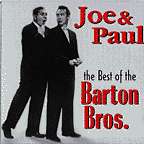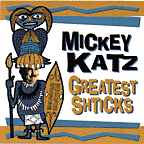Note that the latest stuff may not yet be indexed.
George Robinson, grcomm@grcomm.cnc.net writes for the Jewish Week. His book, "Essential Judaism," was published in hardcover by Pocket Books, March 2000. You can find out more at his website.
Articles by George Robinson, available on the KlezmerShack, are:
The Year's Best: the annual "best of" column, by George Robinson, sent 25 Nov 2002.
A Religious Experience: A roundup of recent Jewish liturgical music, by George Robinson, sent 26 Aug 2002.
More Than Klezmer: A sampler of Yiddish vaudeville, folk music and even art song, sent 9 Aug 2002.
Spring Sephardic Music Roundup, send 3 May 2002.
The Spring Roundup, part 1, sent 9 Mar 2002.
The Spring Roundup, part 2, sent 9 Mar 2002.
The Best of 2001 - Hanukah suggestions, sent 7 Dec 2001.
Isaac Stern: Beyond the Fiddle to the Heart of a Man, sent out 5 Oct 2001.
Sounds for the Jewish New Year, sent out 23 Nov 2001.
Slobin on Beregovski (and the survival of Klezmer Music), sent out 30 Aug 2001.
Women of Valor, sent out 15 Aug 2001.
Shabbat, for Starters, sent out 3 Jun 2001.
From Liturgical Rock to the Postmodern, sent out 15 May 2001.
A Sephardic Passover, sent out 25 Mar 2001.
Oh, Klezmer, sent out 18 Mar 2001.
Jewish Classical Music, sent out 1 Mar 2001.
Best of 2000, send out 23 Dec 2000.
Holiday Music for Hanukkah, 6 Dec 2000.
Kidding on the Square, 9/29/00, from the Jewish Week
From the Catskills to Canada, 6/15/00, from the Jewish Week
Sephardic Survey, 05/00, from the Jewish Week
1999 Klezmer Wrapup, from the Jewish Week
Sisters in Swing, 12/15/99, from the Jewish Week
Bending the Genres, October 1998, from the Jewish Week
The Klezmer Drums of Passion, September 1998, from the Jewish Week
Drums of Passion, summer, 1998, from the Jewish Week
People | Bands | Album Reviews | Sources | Classifieds | Feedback | other klezmer articles on the Internet
Kidding on the Square:
Mickey Katz and the Barton
Brothers Go Berserk
originally published in the Jewish Week, Sep 29, 2000.
Reprinted by permission of the author.
by George Robinson, grcomm@grcomm.cnc.net
I was speaking with a brilliant young student rabbi of my acquaintance last week and mentioned with great enthusiasm that I had been listening to the new CD re-release of "Mickey Katz's Greatest Shticks."
Blank incomprehension.
Imagine my shock.
(It got worse when I referred to Spike Jones and His City Slickers. More incomprehension. What are they teaching our children in the public schools these days?) I knew better than to even mention the Barton Brothers.
Perhaps nothing is deader than last year's jokes.
Happily, with the advent of the compact disk era the record industry has become an all-devouring maw into which producers now pour an astonishing array of music from the ancient past (i.e. the Twentieth Century). So now, you should pardon the expression, l'dor va-dor, you can teach your children about Mickey Katz -- they should know more than "he's Joel Grey's father" or God forbid, "he's Jennifer Grey's grandpa." And a griner like yours truly can know from the Barton Brothers yet.

 By contrast, Katz is buoyant and out front in his giddy insanity like a fifth Marx Brother. (Yes, I know there were five, but who counts Gummo?) The musicianship is at a much higher level than that of the anonymous band backing the Bartons, with trumpeter Manny Klein (ex-Goodman, ex-Dorsey) particularly splendid. And the sound quality is brighter and more burnished (although that could just be the transfer).
By contrast, Katz is buoyant and out front in his giddy insanity like a fifth Marx Brother. (Yes, I know there were five, but who counts Gummo?) The musicianship is at a much higher level than that of the anonymous band backing the Bartons, with trumpeter Manny Klein (ex-Goodman, ex-Dorsey) particularly splendid. And the sound quality is brighter and more burnished (although that could just be the transfer).
Katz was inspired by the Bartons' success with "Joe and Paul" and a stint with Spike Jones to strike out on his own with Yiddishized parodies of contemporary hits. On "Greatest Shticks" "Wheel of Fortune" becomes "Shlemiel of Fortune," "Ghost Riders in the Sky" is transmuted into "Borsht Riders in the Sky," "Witch Doctor" is converted to "Knish Doctor," and "Purple People Eater" to "Purple Kishke Eater."
The material that Katz is parodying is, to put it bluntly, dreck. But it's dreck of a very specific sort -- the plastic detritus of '50s America, the musical equivalent of formica and tuna casseroles, of "Danish" modern and "French" provincial. In short, Katz is a Borscht Belt reply to the growing suburbs, an adamant refusal to surrender to the de-ethnicized homogeneity of Levittown and its hundreds of imitators, a matzah ball in the eye of popular culture. You think "How Much Is That Doggie in the Window" deserves better?
If Katz and the Bartons are occasionally vulgar (and what else could you call a song like "Cockeyed Jenny?"), that too is a reaction against the airbrushed post-WWII era, an era that gave us Playboy and Doris Day movies as its expression of male and female sexuality, respectively. In that respect, they are not so different from Eisenhower-era phenomena as diverse as Norman Mailer's The Deer Park, the gross-out violence of EC Comics and filmmaker Herschel Gordon Lewis, and the edgy hysteria of Jerry Lewis. But in Katz's records, there is a double subversion going on. Whenever an American Jew addresses an mainstream audience, the audience really is two-fold: the American mainstream and the Jewish-American community. We write for one another as much as for the Other. Katz is no exception. His humor is so specifically Jewish, so richly leavened with Yiddishe khametz that his primary audience must have been American Jews, and because the yeast he's using is Yiddish, it is an invitation, a provocation to retain a highly specific Jewish identity. It's as if Katz opened "Duvid Crockett," the first cut on "Greatest Shticks" with a deliberate invocation to his audience: Forget that Davy Crockett shmendrick, yiden, speak Yiddish, think Yiddish, shpritz Yiddish. And that invocation goes -- deliberately, I think -- against the Jewish-American grain of the 1950s. As Peter Novick has pointed out in his controversial book The Holocaust in American Life, major Jewish organizations actively participated in a process of "universalizing" the Holocaust as part of taking the threat out of Jewish Otherness. Jewish-Americans were supposed to lose their accents, move to the suburbs like everybody else and accept the bizarre notion that Chanukah is the just like Christmas, Passover just like Easter and we all believe in National Brotherhood Week.
Which is where Katz comes in with his insistence to Jewish audiences (and to the non-Jews who overhear him) that you can't shuck off your skin as you would a cheap suit. That is also, I think, why Katz's instrumental recordings are less satisfying than the parodies. Although "Music for Weddings, Bar Mitzvahes and Brisses" gets brownie points for the audacity of its title, hearing Katz play klezmer more or less straight lacks the thrill of the subversive, the forbidden acknowledgement of the tension between Jewish-American and American cultures. Katz would have had to be as great a clarinetist as Dave Tarras and Benny Goodman combined to make the change work.
But in "Greatest Shticks" and the other parody albums -- and in the Barton Brothers' sheer chutzpadike vulgarity -- we are allowed to relax a bit among family, loosen our belts and let out a sigh and just be who we are. Or were.
"Mickey Katz's Greatest Shticks" is on the Koch International label and should be available in most record stores (probably in the humor section). "Joe and Paul: The Best of the Barton Brothers" is on BB Records, distributed exclusively by Hatikvah Music, and be ordered from their website, www.hatikvahmusic.com, or by phone, (323) 655-7083.

